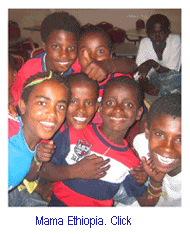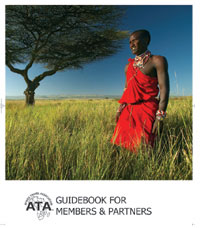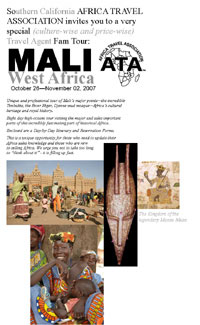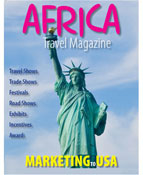|
Twenty years young, and
growing!
International non-profit
organization Africare celebrates 20 years in the
Howard/Shaw community.
WASHINGTON , D.C
At first glance, the old boarded-up school
house appeared to buckle under the weight of
neglect. Once a former elementary school, the
building standing at 440 R. Street, NW would become
the new headquarters of an International nonprofit
organization working in Africa.
 The
building was purchased in 1981 from a public
auction for $159,000 cash, but rather than taking
out bank loans, the driven homeowners-to-be drafted
a campaign to generate nearly $2 million needed to
fix, furnish and equip their new
Headquarters. After five years of
renovations, the ambitious team christened their
new home "Africare House" in October of
1987. The
building was purchased in 1981 from a public
auction for $159,000 cash, but rather than taking
out bank loans, the driven homeowners-to-be drafted
a campaign to generate nearly $2 million needed to
fix, furnish and equip their new
Headquarters. After five years of
renovations, the ambitious team christened their
new home "Africare House" in October of
1987.
"The location is
symbolic," noted Africare's first President and
co-founder, C.Payne Lucas. "We wanted
Africare House to capture the sprit and essence of
Africa ; so we built the institution in the inner
city, somewhere African Americans could feel and
relate to it, and feel proud of it. It became a
community building. It was a place where
people engaged in conversations about Africa and
ideas about Africa how to make Africa work."
Founded in 1970,
Africare was established in the midst of a severe
drought that impacted more than 25 million people
across 6 countries in Western Africa . The
drought sparked a wide-spread food crisis, and
called the attention of a small group of African
and American leaders and development
specialists to address the rising needs of hunger
and malnutrition felt across the region.
Niger would be the first nation to work with
Africare and respond to the needs of its people
through emergency humanitarian assistance.
That assistance would later spread into every
region in Sub-Saharan
Africa.
 Africare
permanently incorporated in Washington , D.C. May
of 1971. Here, the embryonic organization
operated out the basement of one of its founder's
homes before moving into several borrowed rooms
within the Embassy of Niger. When the space
became too tight, dynamic growth carried Africare
from the embassy to rented office space on 16th
Street, and then to Connecticut Avenue. After
ten explosively productive years, Africare was
ready to move into Africare House at long
last. Africare
permanently incorporated in Washington , D.C. May
of 1971. Here, the embryonic organization
operated out the basement of one of its founder's
homes before moving into several borrowed rooms
within the Embassy of Niger. When the space
became too tight, dynamic growth carried Africare
from the embassy to rented office space on 16th
Street, and then to Connecticut Avenue. After
ten explosively productive years, Africare was
ready to move into Africare House at long
last.
"We applaud the
idea of a center embracing Africa as a whole in the
capital city of the United States," endorsed then
dean of the African Diplomatic Corps who spoke at
the official opening of Africare
House.
Africare's founders
developed the nonprofit organization with three
goals in mind: 1) To support development and
relief efforts across 2) the entire continent of
Africa while 3) serving as a bridge between
Africans and Americans, especially African
Americans. Today, Africare has become a
definitive link in a broad-based African/American
development partnership: Africare House is
the home to monthly ANC2 community meetings for the
Howard/Shaw community, and for the United States'
African Ambassadors. Furthermore, Africare
has given local communities the opportunity to
connect with a vibrant and vital force on the
African continent&emdash; an organization which has
instituted over 2000 projects, reaching millions of
beneficiaries, in every major region on the
continent since 1970.
 "Africare
takes a 360-degree approach to development," noted
Africare's second and reigning President Julius E.
Coles. "We address needs in Food Security, Health,
Water and Sanitation, and Emergency Assistance in
the most rural locations on the continent.
Our work begins where the tarmac ends. And
one of our goals operating out of Washington , D.C.
is to connect U.S. communities that are concerned
about international development with African
communities
overseas." "Africare
takes a 360-degree approach to development," noted
Africare's second and reigning President Julius E.
Coles. "We address needs in Food Security, Health,
Water and Sanitation, and Emergency Assistance in
the most rural locations on the continent.
Our work begins where the tarmac ends. And
one of our goals operating out of Washington , D.C.
is to connect U.S. communities that are concerned
about international development with African
communities
overseas."
Initially, Africare
staff consisted of a handful of employees with a
budget just under $40,000; today it exceeds 1,000
international and local staff, with an operating
budget of over $40 million annually-- in large part
due to the donations of concerned individuals in
the U.S.
As a 'thank you' to
Africare friends of past and a 'hello' to future
friendships, Africare will host an open-house
'Block Party' at the end of October at
the Africare House at 440 R. Street NW in
Washington, D.C. The family-friendly
gathering will provide visitors with a chance to
experience the international culture of Africare
House and with food and entertainment, and an
opportunity to learn about the important
initiatives that Africare is implementing on the
continent.
For more
information, please contact Nicole Eley, Media
Relations Manager at neley@africare.org
|

![]()
![]()
![]()
 The
building was purchased in 1981 from a public
auction for $159,000 cash, but rather than taking
out bank loans, the driven homeowners-to-be drafted
a campaign to generate nearly $2 million needed to
fix, furnish and equip their new
Headquarters. After five years of
renovations, the ambitious team christened their
new home "Africare House" in October of
1987.
The
building was purchased in 1981 from a public
auction for $159,000 cash, but rather than taking
out bank loans, the driven homeowners-to-be drafted
a campaign to generate nearly $2 million needed to
fix, furnish and equip their new
Headquarters. After five years of
renovations, the ambitious team christened their
new home "Africare House" in October of
1987. Africare
permanently incorporated in Washington , D.C. May
of 1971. Here, the embryonic organization
operated out the basement of one of its founder's
homes before moving into several borrowed rooms
within the Embassy of Niger. When the space
became too tight, dynamic growth carried Africare
from the embassy to rented office space on 16th
Street, and then to Connecticut Avenue. After
ten explosively productive years, Africare was
ready to move into Africare House at long
last.
Africare
permanently incorporated in Washington , D.C. May
of 1971. Here, the embryonic organization
operated out the basement of one of its founder's
homes before moving into several borrowed rooms
within the Embassy of Niger. When the space
became too tight, dynamic growth carried Africare
from the embassy to rented office space on 16th
Street, and then to Connecticut Avenue. After
ten explosively productive years, Africare was
ready to move into Africare House at long
last. "Africare
takes a 360-degree approach to development," noted
Africare's second and reigning President Julius E.
Coles. "We address needs in Food Security, Health,
Water and Sanitation, and Emergency Assistance in
the most rural locations on the continent.
Our work begins where the tarmac ends. And
one of our goals operating out of Washington , D.C.
is to connect U.S. communities that are concerned
about international development with African
communities
overseas."
"Africare
takes a 360-degree approach to development," noted
Africare's second and reigning President Julius E.
Coles. "We address needs in Food Security, Health,
Water and Sanitation, and Emergency Assistance in
the most rural locations on the continent.
Our work begins where the tarmac ends. And
one of our goals operating out of Washington , D.C.
is to connect U.S. communities that are concerned
about international development with African
communities
overseas." 
